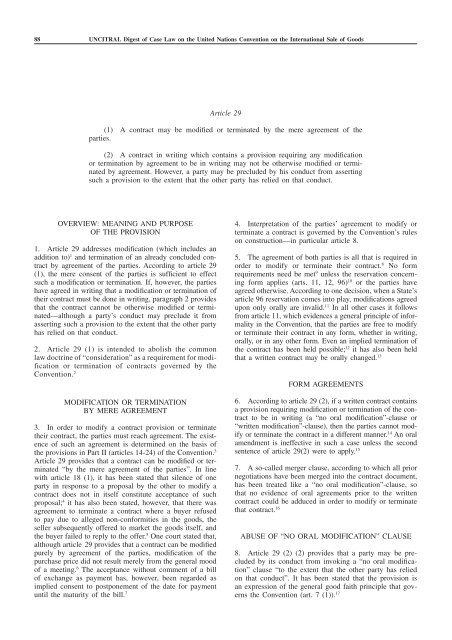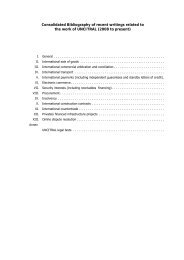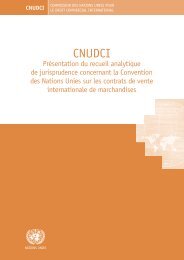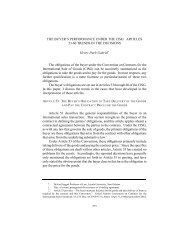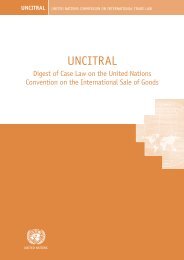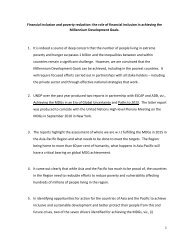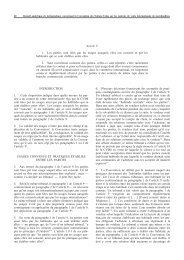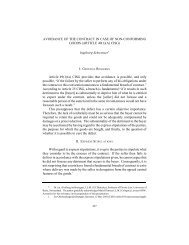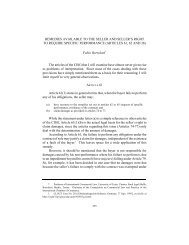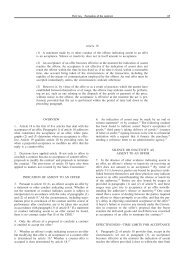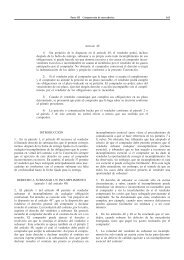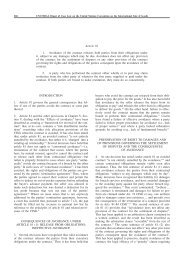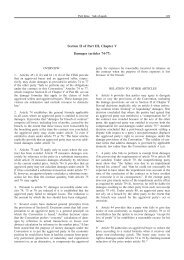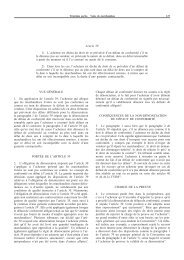Article 29 (1) A contract may be modified or terminated by ... - uncitral
Article 29 (1) A contract may be modified or terminated by ... - uncitral
Article 29 (1) A contract may be modified or terminated by ... - uncitral
Create successful ePaper yourself
Turn your PDF publications into a flip-book with our unique Google optimized e-Paper software.
88 UNCITRAL Digest of Case Law on the United Nations Convention on the International Sale of Goods<br />
<strong>Article</strong> <strong>29</strong><br />
(1) A <strong>contract</strong> <strong>may</strong> <strong>be</strong> <strong>modified</strong> <strong>or</strong> <strong>terminated</strong> <strong>by</strong> the mere agreement of the<br />
parties.<br />
(2) A <strong>contract</strong> in writing which contains a provision requiring any modification<br />
<strong>or</strong> termination <strong>by</strong> agreement to <strong>be</strong> in writing <strong>may</strong> not <strong>be</strong> otherwise <strong>modified</strong> <strong>or</strong> <strong>terminated</strong><br />
<strong>by</strong> agreement. However, a party <strong>may</strong> <strong>be</strong> precluded <strong>by</strong> his conduct from asserting<br />
such a provision to the extent that the other party has relied on that conduct.<br />
OVERVIEW: MEANING AND PURPOSE<br />
OF THE PROVISION<br />
1. <strong>Article</strong> <strong>29</strong> addresses modification (which includes an<br />
addition to) 1 and termination of an already concluded <strong>contract</strong><br />
<strong>by</strong> agreement of the parties. Acc<strong>or</strong>ding to article <strong>29</strong><br />
(1), the mere consent of the parties is sufficient to effect<br />
such a modification <strong>or</strong> termination. If, however, the parties<br />
have agreed in writing that a modification <strong>or</strong> termination of<br />
their <strong>contract</strong> must <strong>be</strong> done in writing, paragraph 2 provides<br />
that the <strong>contract</strong> cannot <strong>be</strong> otherwise <strong>modified</strong> <strong>or</strong> <strong>terminated</strong>—although<br />
a party’s conduct <strong>may</strong> preclude it from<br />
asserting such a provision to the extent that the other party<br />
has relied on that conduct.<br />
2. <strong>Article</strong> <strong>29</strong> (1) is intended to abolish the common<br />
law doctrine of “consideration” as a requirement f<strong>or</strong> modification<br />
<strong>or</strong> termination of <strong>contract</strong>s governed <strong>by</strong> the<br />
Convention. 2<br />
MODIFICATION OR TERMINATION<br />
BY MERE AGREEMENT<br />
3. In <strong>or</strong>der to modify a <strong>contract</strong> provision <strong>or</strong> terminate<br />
their <strong>contract</strong>, the parties must reach agreement. The existence<br />
of such an agreement is determined on the basis of<br />
the provisions in Part II (articles 14-24) of the Convention. 3<br />
<strong>Article</strong> <strong>29</strong> provides that a <strong>contract</strong> can <strong>be</strong> <strong>modified</strong> <strong>or</strong> <strong>terminated</strong><br />
“<strong>by</strong> the mere agreement of the parties”. In line<br />
with article 18 (1), it has <strong>be</strong>en stated that silence of one<br />
party in response to a proposal <strong>by</strong> the other to modify a<br />
<strong>contract</strong> does not in itself constitute acceptance of such<br />
proposal; 4 it has also <strong>be</strong>en stated, however, that there was<br />
agreement to terminate a <strong>contract</strong> where a buyer refused<br />
to pay due to alleged non-conf<strong>or</strong>mities in the goods, the<br />
seller subsequently offered to market the goods itself, and<br />
the buyer failed to reply to the offer. 5 One court stated that,<br />
although article <strong>29</strong> provides that a <strong>contract</strong> can <strong>be</strong> <strong>modified</strong><br />
purely <strong>by</strong> agreement of the parties, modification of the<br />
purchase price did not result merely from the general mood<br />
of a meeting. 6 The acceptance without comment of a bill<br />
of exchange as payment has, however, <strong>be</strong>en regarded as<br />
implied consent to postponement of the date f<strong>or</strong> payment<br />
until the maturity of the bill. 7<br />
4. Interpretation of the parties’ agreement to modify <strong>or</strong><br />
terminate a <strong>contract</strong> is governed <strong>by</strong> the Convention’s rules<br />
on construction—in particular article 8.<br />
5. The agreement of both parties is all that is required in<br />
<strong>or</strong>der to modify <strong>or</strong> terminate their <strong>contract</strong>. 8 No f<strong>or</strong>m<br />
requirements need <strong>be</strong> met 9 unless the reservation concerning<br />
f<strong>or</strong>m applies (arts. 11, 12, 96) 10 <strong>or</strong> the parties have<br />
agreed otherwise. Acc<strong>or</strong>ding to one decision, when a State’s<br />
article 96 reservation comes into play, modifications agreed<br />
upon only <strong>or</strong>ally are invalid. 11 In all other cases it follows<br />
from article 11, which evidences a general principle of inf<strong>or</strong>mality<br />
in the Convention, that the parties are free to modify<br />
<strong>or</strong> terminate their <strong>contract</strong> in any f<strong>or</strong>m, whether in writing,<br />
<strong>or</strong>ally, <strong>or</strong> in any other f<strong>or</strong>m. Even an implied termination of<br />
the <strong>contract</strong> has <strong>be</strong>en held possible; 12 it has also <strong>be</strong>en held<br />
that a written <strong>contract</strong> <strong>may</strong> <strong>be</strong> <strong>or</strong>ally changed. 13<br />
FORM AGREEMENTS<br />
6. Acc<strong>or</strong>ding to article <strong>29</strong> (2), if a written <strong>contract</strong> contains<br />
a provision requiring modification <strong>or</strong> termination of the <strong>contract</strong><br />
to <strong>be</strong> in writing (a “no <strong>or</strong>al modification”-clause <strong>or</strong><br />
“written modification”-clause), then the parties cannot modify<br />
<strong>or</strong> terminate the <strong>contract</strong> in a different manner. 14 An <strong>or</strong>al<br />
amendment is ineffective in such a case unless the second<br />
sentence of article <strong>29</strong>(2) were to apply. 15<br />
7. A so-called merger clause, acc<strong>or</strong>ding to which all pri<strong>or</strong><br />
negotiations have <strong>be</strong>en merged into the <strong>contract</strong> document,<br />
has <strong>be</strong>en treated like a “no <strong>or</strong>al modification”-clause, so<br />
that no evidence of <strong>or</strong>al agreements pri<strong>or</strong> to the written<br />
<strong>contract</strong> could <strong>be</strong> adduced in <strong>or</strong>der to modify <strong>or</strong> terminate<br />
that <strong>contract</strong>. 16<br />
ABUSE OF “NO ORAL MODIFICATION” CLAUSE<br />
8. <strong>Article</strong> <strong>29</strong> (2) (2) provides that a party <strong>may</strong> <strong>be</strong> precluded<br />
<strong>by</strong> its conduct from invoking a “no <strong>or</strong>al modification”<br />
clause “to the extent that the other party has relied<br />
on that conduct”. It has <strong>be</strong>en stated that the provision is<br />
an expression of the general good faith principle that governs<br />
the Convention (art. 7 (1)). 17
Part three. Sale of goods 89<br />
Notes<br />
1<br />
See CLOUT case No. 86 [Federal District Court, Southern District of New Y<strong>or</strong>k, United States, 22 Septem<strong>be</strong>r 1994] (see full text<br />
of the decision).<br />
2<br />
See Secretariat Commentary to (then) article 27 (‘overcoming the common law rule that “consideration” is required’) Commentary<br />
on the draft Convention on Contracts f<strong>or</strong> the International Sale of Goods, A/CONF.97/5, reproduced in United Nations Conference on<br />
Contracts f<strong>or</strong> the International Sale of Goods: Official Rec<strong>or</strong>ds, at p. 28, paras. 2-3.<br />
3<br />
CLOUT case No. 120 [O<strong>be</strong>rlandesgericht Köln, Germany, 22 February 1994]; to the same effect see CLOUT case No. 153 [Cour<br />
d’appel, Grenoble, France, <strong>29</strong> March 1995], and CLOUT case No. 332 [O<strong>be</strong>rgericht des Kantons, Basel-Landschaft Switzerland 11 June<br />
1999].<br />
4<br />
CLOUT case No. 120 [O<strong>be</strong>rlandesgericht Köln Germany 22 February 1994]; CLOUT case No. 332 [O<strong>be</strong>rgericht des Kantons Basel-<br />
Landschaft, Switzerland, 11 June 1999].<br />
5<br />
CLOUT case No. 120 [O<strong>be</strong>rlandesgericht Köln, Germany, 22 February 1994].<br />
6<br />
CLOUT case No. 153 [Cour d’appel, Grenoble, France, <strong>29</strong> March 1995].<br />
7<br />
CLOUT case No. 5 [Landgericht Hamburg, Germany, 26 Septem<strong>be</strong>r 1990] (see full text of the decision).<br />
8<br />
CLOUT case No. 176 [O<strong>be</strong>rster Gerichtshof, Austria, 6 February 1996].<br />
9<br />
CLOUT case No. 413 [Federal District Court, Southern District of New Y<strong>or</strong>k, United States, 6 April 1998] (see full text of the decision);<br />
CLOUT case No. 422 [O<strong>be</strong>rster Gerichtshof, Austria, <strong>29</strong> June 1999], Zeitschrift für Rechtsvergleichung 2000, 33.<br />
10<br />
F<strong>or</strong> a similar case see Rechtbank van Koophandel, Hasselt, Belgium, 2 May 1995, available on the Internet at http://www.law.<br />
kuleuven.<strong>be</strong>/ipr/eng/cases/1995-05-02.html.<br />
11<br />
Inf<strong>or</strong>mation Letter No. <strong>29</strong> of the High Arbitration Court of the Russian Federation, Russian Federation, 16 February 1998, Unilex<br />
(abstract).<br />
12<br />
CLOUT case No. 422 [O<strong>be</strong>rster Gerichtshof, Austria, <strong>29</strong> June 1999], Zeitschrift für Rechtsvergleichung 2000, 33.<br />
13<br />
CLOUT case No. 176 [O<strong>be</strong>rster Gerichtshof, Austria, 6 February 1996] (see full text of the decision).<br />
14<br />
ICC Court of Arbitration, Switzerland, March 1998, ICC International Court of Arbitration Bulletin, 2000, 83.<br />
15<br />
CLOUT case No. 86 [Federal District Court, Southern District of New Y<strong>or</strong>k, United States, 22 Septem<strong>be</strong>r 1994].<br />
16<br />
ICC Court of Arbitration, Switzerland, March 1998, ICC International Court of Arbitration Bulletin, 2000, 83.<br />
17<br />
CLOUT case No. 94 [Arbitration-Internationales Schiedsgericht der Bundeskammer der gewerblichen Wirtschaft–Wien, 15 June<br />
1994].


